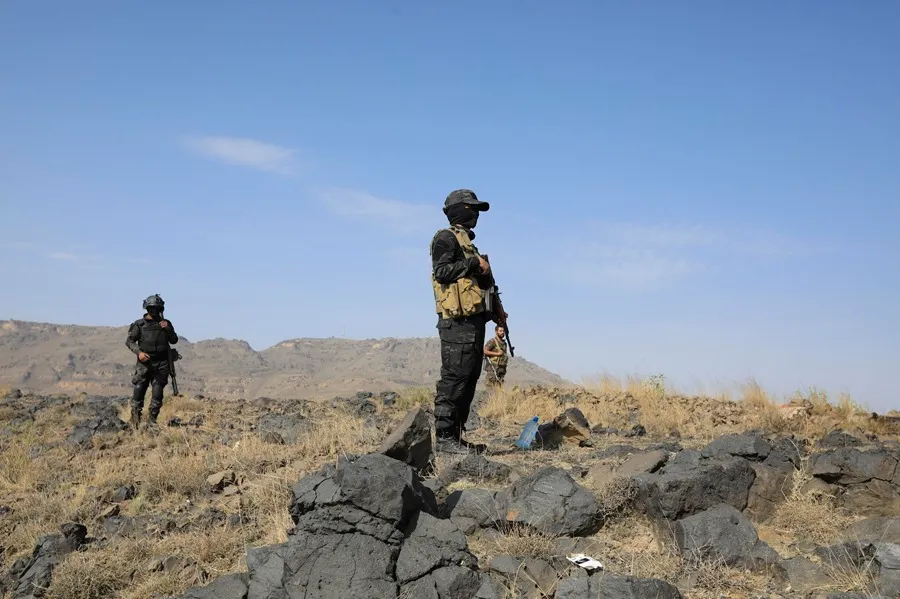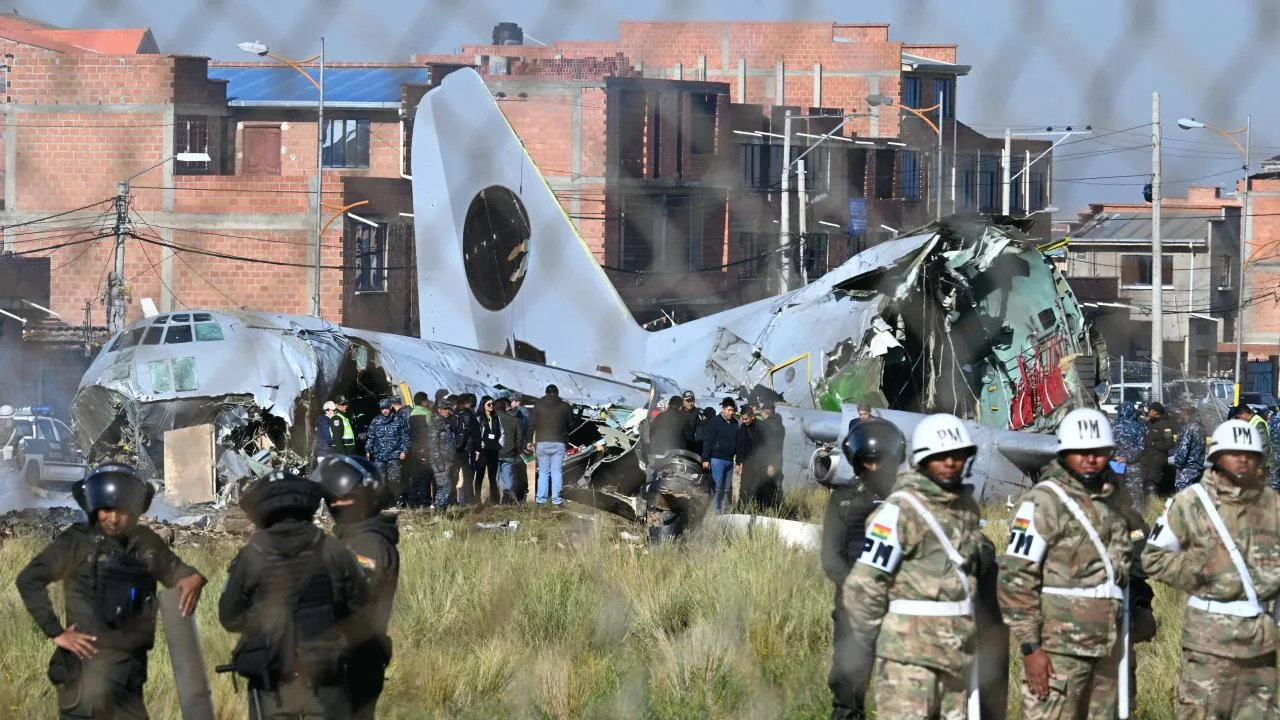International
Yemen’s Houthi rebels dismiss 39 ministers and leave a government without women

The Houthi rebels of Yemen announced on Monday an important reorganization of their internationally unrecognized government – in which the female presence completely disappears -, consisting of the dismissal of 39 ministers and the reduction of the number of ministries from 42 to 21.
Two days after the appointment of a new prime minister, the head of the Supreme Political Council of the Houthi, Mahdi al Mashat, issued a decree in which he appoints the members of the new government, which will be headed by the newly appointed prime minister, Ahmad al Rahawi, and whom he asked to form a new Executive after leaving the ministerial portfolios in the middle, reported the Houthi news agency Saba.
Sheikh Mohamed Muftah, who heads the Huti National Committee to Support Al Aqsa, was appointed first deputy prime minister in this remodeling in which only the Deputy Prime Minister of Defense and Security, Jalal al Rowaishan; the Minister of Defense, Mohamed al Atifi, and the Minister of the Interior, AbdulKreem al Huti, retained their positions in the new cabinet, according to this decree.
Among the ministers who were dismissed is the Minister of Education, Yahya al Huti, brother of the leader of the group, Abdulmalik al Huti. The female presence of the previous Government, which included a Minister of Human Rights and two Ministers of State without a portfolio, disappears completely.
This reorganization of the cabinet meant the merger of some portfolios, including those of Justice and Human Rights, Foreign Affairs and Expatriates, Public Service and Administrative Development, Transport and Public Works.
The portfolios of Economy, Industry and Investment, Agriculture, Fisheries and Water Resources, Education and Scientific Research, Electricity, Energy and Water, Health and Environment, Culture and Tourism were also affected.
The new government was abolished the portfolios of International Planning and Cooperation, Technical Education and Vocational Training, Legal Affairs, Religious Guidance, Local Administration, as well as the positions of Ministers of State.
The formation of the new government shows the determination of the Houthis to rationalize spending and control inflation in the administrative structure of their government in the midst of their operations in the Red Sea framed by the conflict in the Gaza Strip.
In addition, the appointment of politicians from the southern provinces for some government portfolios indicates an attempt to please the Southerners, whose areas are under the control of the internationally recognized government and the Southern Transitional Council backed by the United Arab Emirates, both rivals of the Houthis.
International
Bolivia Orders Three Investigations Into Deadly Military Plane Crash

Bolivia’s Defense Minister Marcelo Salinas announced Monday that three separate investigations will be conducted into Friday’s crash of a military cargo aircraft at El Alto International Airport, near La Paz, which left at least 22 people dead.
The Hercules aircraft, operated by the Fuerza Aérea Boliviana (FAB), was transporting cash intended for the Central Bank of Bolivia when it overshot the runway after landing from the city of Santa Cruz. The plane reportedly traveled nearly one kilometer beyond the airport perimeter.
The incident sparked chaotic scenes, with individuals attempting to collect scattered banknotes. Authorities detained 51 people in the aftermath, and the government declared three days of national mourning.
Multiple Investigations Underway
The first inquiry is being led by a military board from the Bolivian Air Force, which has already taken custody of the aircraft’s black box for analysis.
Minister Salinas said two additional investigations will follow — one conducted by the insurance company and another by the aircraft’s manufacturer.
“At least two more investigations will come, that of the insurance company and that of the aircraft manufacturer,” Salinas said during a press conference in Santa Cruz.
He cautioned that the investigative process could take between three and six months, noting that the black box cannot be opened in Bolivia due to the lack of specialized laboratories for analysis.
Awaiting Official Findings
Salinas stressed that the FAB investigative board is the highest authority in the case and urged the public to wait for its conclusions to avoid speculation about the causes of the crash.
He also confirmed that the government has contacted the families of the 22 victims and the 37 injured, as well as the owners of 15 damaged vehicles, to coordinate procedures with the insurer and cover the corresponding expenses.
International
Mexico Calls for Immediate Probe After National Dies in ICE Custody

Mexico’s Secretaría de Relaciones Exteriores (SRE) on Monday called on U.S. authorities to conduct an “immediate and thorough” investigation into the death of a Mexican national while in custody of U.S. Immigration and Customs Enforcement (ICE) at a processing facility in California.
In a statement, the Mexican government described the death as “regrettable” and urged U.S. officials to clarify the circumstances surrounding the case in order to “determine responsibilities and ensure that such events do not happen again.”
Death at Adelanto Processing Center
According to available information, the Mexican citizen died at the Adelanto Processing Center in California while under ICE custody. Authorities have not yet released the individual’s identity or the cause of death.
Following the incident, Mexico’s Foreign Ministry formally requested “detailed information” from U.S. authorities, including the detainee’s medical records and custody reports.
Consular Assistance Activated
The Mexican Consulate in San Bernardino, California, has activated consular assistance protocols to provide ongoing support to the deceased’s family. Officials have contacted relatives to express condolences and offer legal guidance, as well as assistance with the necessary procedures to repatriate the remains.
“The handling of situations like this and the establishment of mechanisms to resolve them are priorities for the Government of Mexico,” the Foreign Ministry said, adding that it will formally request an investigation into any systemic conditions that may have contributed to such incidents.
Local Mexican media reported that seven Mexican nationals died while in ICE detention last year — the highest number recorded since the agency was created.
International
Anti-ICE Billboard Campaign Targets Immigration Spending in 31 U.S. Cities

More than 200 billboards criticizing U.S. Immigration and Customs Enforcement (ICE) began appearing Monday in 31 cities across the United States, including Miami, as part of a campaign highlighting the high cost of immigration enforcement operations for taxpayers.
The initiative, titled “ICE Costs Us,” was launched by the civil rights organization Mijente and will run for four weeks.
Criticism of Spending and Enforcement Tactics
The billboards feature images of ICE agents during arrests or carrying military-style weapons. According to the organization, spending on military-grade equipment for the agency has increased by 600 percent in recent years.
Several signs display messages such as:
“Your taxes are being wasted” and “ICE’s cruelty costs you $28 billion,” referring to the agency’s annual budget.
In a statement, Marisa Franco, co-founder of the Mijente Support Committee, said:
“For too long, our government has prioritized building cages and investing billions in an immigration enforcement apparatus that has left families torn apart and communities terrified.”
She added that “Millions of Americans are living paycheck to paycheck, yet this violent agency continues operating with a blank check. These decisions do not make us safer nor improve our economic security. Our billboards highlight these choices and demand a different path.”
Budget Debate and Medicaid Comparison
The campaign also draws a comparison between ICE’s funding and the estimated 17 million people who could lose health coverage under Medicaid due to federal budget cuts under President Donald Trump.
Other billboard messages seen in various cities include:
“They get billions to beat us; we get layoffs and rising rents” and “Funding ICE is a fast track to fascism.”
Organizers say the goal is to spark public debate about the allocation of federal funds for immigration enforcement and the broader economic and social impact of such policies on communities nationwide.
-

 International2 days ago
International2 days agoIran Reports 201 Dead, 747 Injured After U.S. and Israeli Strikes
-

 International5 days ago
International5 days agoCocaine Production Surges 34% in 2023 as Market Expands into Africa and Asia
-

 International4 days ago
International4 days agoTrump Floats “Friendly Takeover” of Cuba Amid Rising Tensions
-

 Sin categoría3 days ago
Sin categoría3 days agoTrump: ‘We Think It’s True’ Amid Claims Iran’s Supreme Leader Was Killed
-

 International3 days ago
International3 days agoSecurity Council to Hold Emergency Meeting on Middle East Crisis
-

 International2 days ago
International2 days agoPope Leo XIV Urges End to ‘Spiral of Violence’ in Middle East
-

 International5 days ago
International5 days agoFederal Judge Blocks Trump Policy Allowing Deportations to Third Countries
-

 International4 days ago
International4 days agoArgentina’s Senate Reviews Milei-Backed Labor Overhaul
-

 International15 hours ago
International15 hours agoBrazil’s Supreme Court Rejects Bolsonaro’s Bid for House Arrest
-

 International5 days ago
International5 days agoClinton Accuses Republican Committee of Using Epstein Case to Shield Trump
-

 International15 hours ago
International15 hours agoAnti-ICE Billboard Campaign Targets Immigration Spending in 31 U.S. Cities
-

 International15 hours ago
International15 hours agoTrump Warns of ‘Major Wave’ of Attacks as Iran Conflict Escalates
-

 International15 hours ago
International15 hours agoMexico Calls for Immediate Probe After National Dies in ICE Custody
-

 Central America15 hours ago
Central America15 hours agoPanama Canal Monitoring Trade as Middle East Conflict Disrupts Shipping
-

 International15 hours ago
International15 hours agoBolivia Orders Three Investigations Into Deadly Military Plane Crash




























